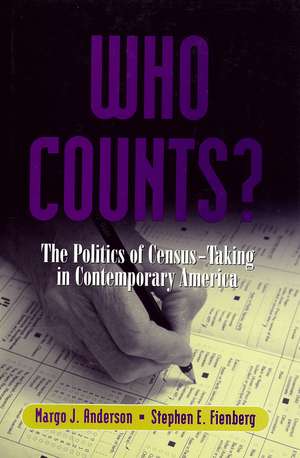Who Counts?: The Politics of Census-Taking in Contemporary America
Autor Margo Anderson, Stephen E. Fienbergen Limba Engleză Paperback – 21 mar 2001
One of Choice Magazine's Outstanding Academic Books of 2000 For those interested in understanding the historical and scientific context of the census adjustment controversy, Who Counts? is absolutely essential reading. —Science Ever since the founding fathers authorized a national headcount as the means of apportioning seats in the federal legislature, the decennial census has been a political battleground. Political power, and more recently the allocation of federal resources, depend directly upon who is counted and who is left out. Who Counts? is the story of the lawsuits, congressional hearings, and bureaucratic intrigues surrounding the 1990 census. These controversies formed largely around a single vexing question: should the method of conducting the census be modified in order to rectify the demonstrated undercount of poor urban minorities? But they also stemmed from a more general debate about the methods required to count an ever more diverse and mobile population of over two hundred million. The responses to these questions repeatedly pitted the innovations of statisticians and demographers against objections that their attempts to alter traditional methods may be flawed and even unconstitutional. Who Counts? offers a detailed review of the preparation, implementation, and aftermath of the last three censuses. It recounts the growing criticisms of innaccuracy and undercounting, and the work to develop new enumeration strategies. The party shifts that followed national elections played an increasingly important role in the politization of the census, as the Department of Commerce asserted growing authority over the scientific endeavors of the Census Bureau. At the same time, each decade saw more city and state governments and private groups bringing suit to challenge census methodology and results. Who Counts? tracks the legal course that began in 1988, when a coalition led by New York City first sued to institute new statistical procedures in response to an alleged undercount of urban inhabitants. The challenge of accurately classifying an increasingly mixed population further threatens the legitimacy of the census, and Who Counts? investigates the difficulties of gaining unambiguous measurements of race and ethnicity, and the proposal that the race question be eliminated in favor of ethnic origin. Who Counts? concludes with a discussion of the proposed census design for 2000, as well as the implications of population counts on the composition and size of Congress. This volume reveals in extraordinary detail the interplay of law, politics, and science that propel the ongoing census debate, a debate whose outcome will have a tremendous impact on the distribution of political power and economic resources among the nation's communities. A Volume in the Russell Sage Foundation Census Series
Preț: 222.33 lei
Nou
Puncte Express: 333
Preț estimativ în valută:
42.54€ • 44.53$ • 35.41£
42.54€ • 44.53$ • 35.41£
Carte indisponibilă temporar
Doresc să fiu notificat când acest titlu va fi disponibil:
Se trimite...
Preluare comenzi: 021 569.72.76
Specificații
ISBN-13: 9780871542571
ISBN-10: 0871542579
Pagini: 376
Dimensiuni: 152 x 229 x 30 mm
Greutate: 0.55 kg
Editura: Russell Sage Foundation
Colecția Russell Sage Foundation
ISBN-10: 0871542579
Pagini: 376
Dimensiuni: 152 x 229 x 30 mm
Greutate: 0.55 kg
Editura: Russell Sage Foundation
Colecția Russell Sage Foundation
Notă biografică
MARGO J. ANDERSON is professor of history and urban studies at the University of Wisconsin–Madison. STEPHEN E. FIENBERG is Maurice Falk University Professor of Statistics and Social Change at Carnegie Mellon University.
